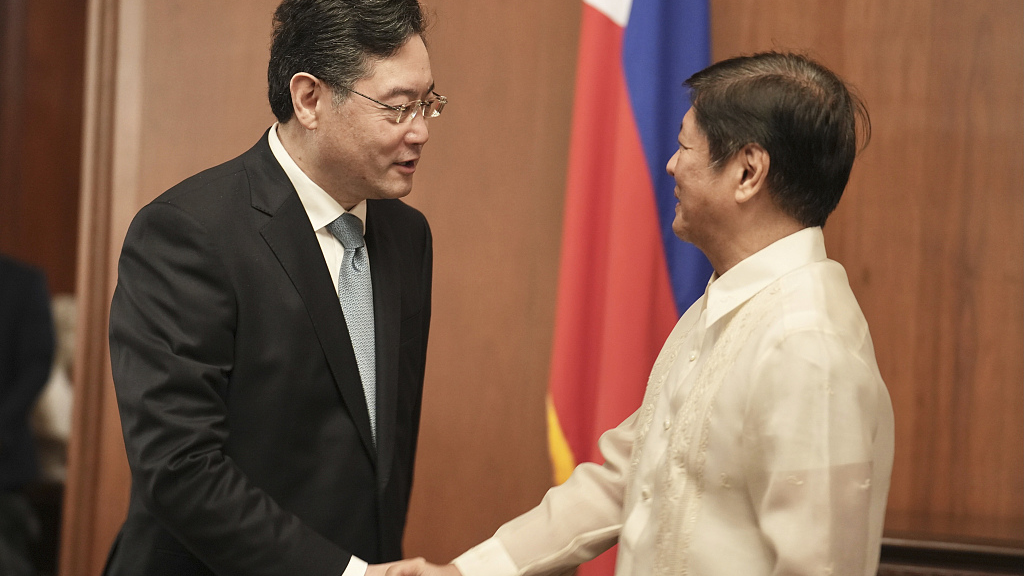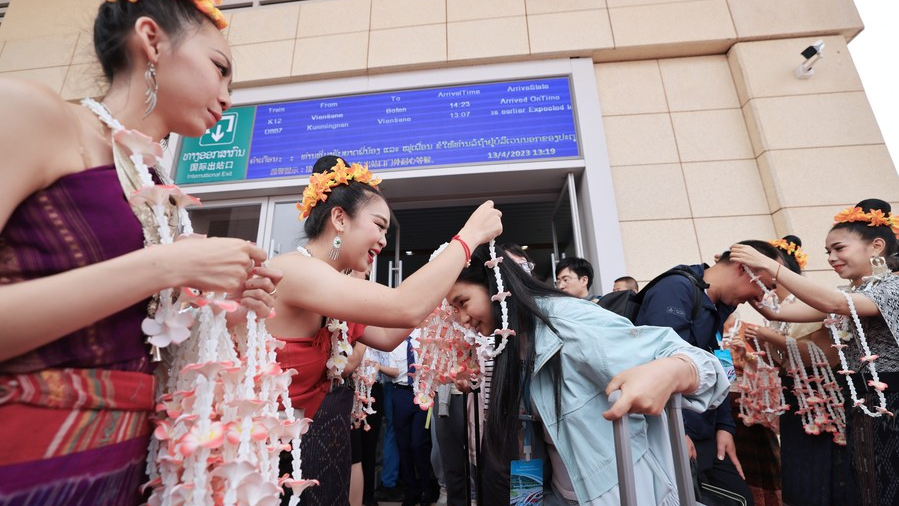
Philippines President Ferdinand Romualdez Marcos Jr. (R) welcomes Chinese Foreign Minister Qin Gang at Malacanang Palace in Manila, capital of the Philippines, April 22, 2023. /CFP
Philippines President Ferdinand Romualdez Marcos Jr. (R) welcomes Chinese Foreign Minister Qin Gang at Malacanang Palace in Manila, capital of the Philippines, April 22, 2023. /CFP
Editor's note: Adhere Cavince is a scholar of International Relations with a focus on China-Africa cooperation. The article reflects the author's opinions, and not necessarily those of CGTN.
Following the optimization of the COVID-19 management by China, a number of world leaders from Africa, Europe, Asia, the Middle East, and Latin America have traveled to Beijing to hold discussions on how to promote not just bilateral ties but also the global wellness of humanity. Some of the leaders who have recently visited China include Gabonese President Ali Bongo Ondimba, French President Emmanuel Macron, Brazilian President Lula da Silva, President of the European Commission Ursula von der Leyen, and Singaporean Prime Minister Lee Hsien Loong.
Similarly, Chinese leaders have also traveled abroad. President Xi Jinping visited Russia in March and Foreign Minister Qin Gang visited the Philippines this week. The two-way diplomatic exchanges between China and the rest of the world bring into focus the increasing role of China as a major global actor whose support and cooperation are highly sought by other countries. Visits of foreign leaders can therefore be seen as a recognition of China's growing stature on the global stage.
As the second-largest economy in the world and a key player in global supply chains, what happens in China matters to the rest of the world. China's economy is now expected to grow by 5.1 percent in 2023, injecting new impetus into the global economic outlook, which is now projected to grow by 2 percent, compared with an initial growth outlook of 1.7 percent, according to the World Bank.
China's ability to convene on a global scale is now widely recognized. Through consistent, sincere, and mutually beneficial diplomatic efforts, China is bringing countries together in a quest for a modern form of international cooperation with peace and development at the core.
On peace and security, China proposed the Global Security Initiative (GSI) to stem the tide of confrontations and conflict, promote peaceable relations among countries and foster progressive peace governance frameworks. China's success in brokering a truce between Saudi Arabia and Iran is a major milestone in the implementation of the GSI as it eases off regional tensions by enhancing cooperation among countries of the Middle East. It is a practical example of what honest and inclusive diplomacy is about in a world fraught with conflicts and war mentalities.
On economic development, China has consolidated enviable progress at home and continues to extend support for other countries to overcome various development challenges. This year marks a decade since the Belt and Road Initiative was launched by China. Over $1 trillion has since been appropriated for various development projects under the BRI's five pillars: policy coordination, facilities connectivity, unimpeded trade, financial integration, and people-to-people exchanges. As a result, trade volumes have soared, and infrastructure projects have been completed. The BRI has exemplified China's will to share the proceeds of its development with the rest of the world toward a prosperous future for all.

Lao staff members greet passengers taking the first cross-border passenger train from Kunming, capital of southwest China's Yunnan Province, to Lao capital Vientiane at the Boten Station of the China-Laos Railway in Luang Namtha, Laos, April 13, 2023. /Xinhua
Lao staff members greet passengers taking the first cross-border passenger train from Kunming, capital of southwest China's Yunnan Province, to Lao capital Vientiane at the Boten Station of the China-Laos Railway in Luang Namtha, Laos, April 13, 2023. /Xinhua
On multilateralism, Beijing has been steadfast in advancing the shared interests of the United Nations member states. Through avenues like the Forum on China-Africa Cooperation, China has pushed the frontiers of joint work with other nations to solve cross-border challenges.
Many countries view Beijing as a reliable partner due to the practical international cooperation mechanisms initiated by China. African leaders have, for instance, been forthright in defending their partnerships with China in the face of criticism from Western countries. Instead of empty rhetoric from some of Africa's traditional partners, China has placed its technology, finances, and even personnel forefront of innovating solutions for Africa's development challenges. Africa is not the only region finding value in its partnership with China. The trends for other regions also point to increased collaboration with Beijing.
For many countries, it is China's example that has made cooperation possible and sustainable. It is a trajectory that is not likely to be dimmed by China's rivals in the international scene.
(If you want to contribute and have specific expertise, please contact us at opinions@cgtn.com. Follow @thouse_opinions on Twitter to discover the latest commentaries in the CGTN Opinion Section.)